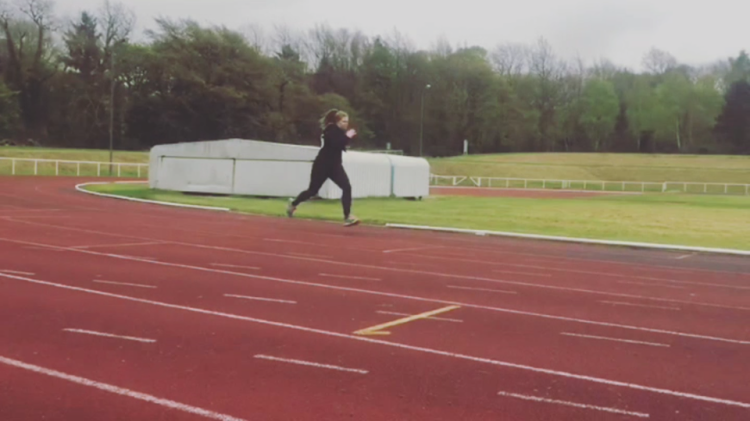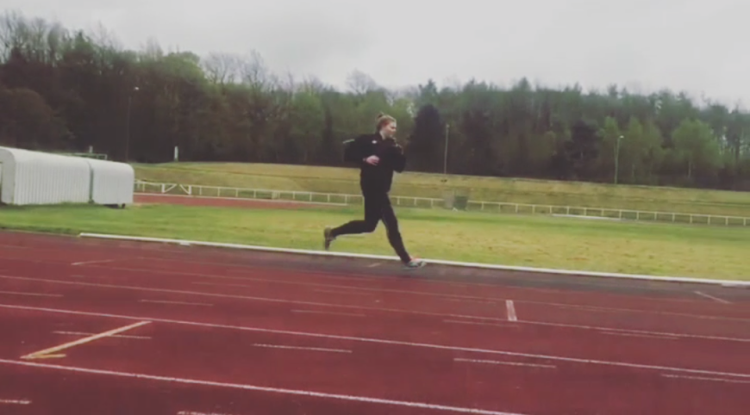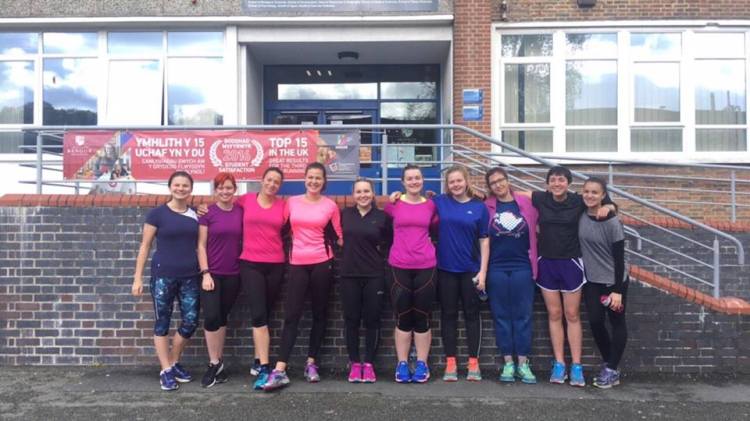
Since my last blog I have said goodbye to my born to run class and the module. It has been very emotional but as my degree is coming to an end, I can begin to fully focus on the marathon that is only 3 weeks away! Training has been getting tougher as I completed my final long run before the big day this week, a whopping 32km! Although it was difficult, I am beyond proud of myself. I truly believe that anybody can achieve any goal that they put their mind to; as long as they adapt the principles of positive psychology and take small steps towards fully achieving their goals.
As this is my final blog, I wanted to pinpoint the most powerful techniques that have helped me on my journey to success. Although I have not completed the marathon yet, I am so proud of my achievements and how far I have come. 13 weeks ago, I could barely run to the end of my road and now I can complete 20 LONG MILE RUNS!! If I can do this, I believe than anybody else can! Think of this as a quick guide on how to achieve things that you never thought were possible! Here are my top 5 tips to greatness…
 Focus on goal setting
Focus on goal setting
Goal setting is an extremely important factor that contributes to the outcome of success. An individual must devise goals in order to give them focus and direction. Goals allow you to take control of the direction of your aims and also provides a benchmark for determining how you’re getting on as you strive towards success. Goals need to be considered carefully in order for them to become a success. It is important to ensure that your goals motivate you and that they are important to you, otherwise, you will not be motivated enough to achieve them. Goal achievement requires commitment and therefore it is important that the goal is significant to you to ensure that you can fully commit to it. An effective way of setting goals is the use of the SMART goals technique (Conzemius & O’Neill, 2011). In order for goals to be powerful, they must be SMART; an acronym that stands for specific, measurable, attainable, relevant and time-bound (Prather, 2005). It is necessary that goals are clear and well defined in order to give them a direction. Defining your end goal precisely, allows you to achieve more easily, therefore; it is important to set specific goals. To ensure that your goals are measurable, include precise dates that can be used to measure how successful you are. Set goals that are attainable so that you don’t lose your confidence and to ensure success. Goals must be relevant in order to maintain focus and to guide you that you into a relevant direction. In order to celebrate your end success, ensure that your goals are time-bound!

Use positive self-talk
Another important psychological technique necessary for success is the use of positive self talk. I have found this to be an extremely effective way of getting through tough runs. Self-talk can be defined as ‘our inner voice’ (Theodorakis, Weinberg, Natsis, Douma & Kazakas, 2000), the way that we communicate with ourselves when faced with a difficult task. An example of this technique is telling yourself ‘you can do this’, ‘you’re doing brilliantly, keep going’. Positive self talk increases self-confidence and can reduce anxiety (Hatzigeorgiadis, Zourbanos, Mpoumpaki & Theodorakis, 2009). Positive self talk has also been found to improve sporting performance (Van Raalte, Brewer, Cornelius & Petitpas, 2006). If you continue to tell yourself how great you are for pursuing your goals, you will be able to get through difficult training and be successful!
 Have a mantra
Have a mantra
Mantra’s can be really helpful in contributing towards your success. A mantra can be defined as a word or a sound that is repeated in order to aid concentration. Repeating a choice word guides attention towards success and away from any distractions (Eason, 2013) . If you are struggling to keep focus during your journey to greatness, have a mantra! My personal favourite’s are to sing S Club 7’s ‘Bring it all back’ or to repeat ‘Nel blu dipinto di blu by Domenico Modugno.
 Use imagery
Use imagery
During the pursuit for success, it is useful to incorporate imagery techniques. Use your imagination to visualise yourself achieving your goals and succeeding. I visualise myself crossing the finish line of the marathon when I struggle during my training runs. I find this to be a particularly effective method. The imagination is powerful (Hall, Rodgers & Barr, 1990) and therefore you should utilise it to divert your attention towards success.
 Adapt a positive mind set; you can do anything!
Adapt a positive mind set; you can do anything!
The most important thing to bear in mind when attempting to achieve your goals is to stay positive. When deciding to set a goal for yourself you are already winning! You’re taking a step in the correct direction towards achieving your dreams. If you continue to tell yourself how amazing you are, you will show amazing progress. Remain positive, be resilient and never forget to smile! I truly believe that you can do anything that you set your mind to.

I am so proud of my personal journey and I cannot wait for the rock and roll marathon! I am also proud of all of my class mates that have also utilised principles of positive psychology in order to follow their goals.
To keep up with my recent training, I have attached my training plan from the past couple of weeks (see below).
| Monday | Tuesday | Wednesday | Thursday | Friday | Saturday | Sunday |
| REST | 7.1km | Spin Class and 2km | 4.6km | Track session and Spin Class | 26km | 8.1km walk |
| Monday | Tuesday | Wednesday | Thursday | Friday | Saturday | Sunday |
| 6.7km | Spin Class | Walk | Spin Class | REST | REST | 32km |
Today I completed my longest run before the marathon (see below) and from here on, I am going to begin to taper. Tapering is reducing the volume and intensity of training leading up to the race (Morton, Fitz-Clarke & Banister, 1990) in order to rest the body; ready for the big day. Last week, I trained at too high of an intensity and was not able to complete the long run that I had planned on the Sunday. I do not want to make the same error during the marathon and therefore; I will taper.


(Longest run before the marathon- super proud!)
Hopefully all of my training and effort will help me to succeed and complete the goal that I carefully set for myself 13 weeks ago. My personal goal was to ‘complete the Liverpool rock and roll marathon on the 28th of May 2017’; fingers crossed I will achieve this!
This journey has been incredible. I know I’m not the fastest runner but I feel strong and confident. I have covered some incredible distances and I have set a new goal for the future; I aim to join a running club within the next year! I love running and the positivity that surrounds it. I have caught a bug and I never want it to end!
 (Track session. Photo credits: Emily Swain)
(Track session. Photo credits: Emily Swain)
 (Running on the track. Photo credits: Emily Swain)
(Running on the track. Photo credits: Emily Swain)
 (One of my last runs in beautiful Bangor. Photo credits: Emily Swain)
(One of my last runs in beautiful Bangor. Photo credits: Emily Swain)
 (Last born to run session- I will miss Bangor and the views!)
(Last born to run session- I will miss Bangor and the views!)

(Last run with my fabulous class! Photo credits: Alana Davies)
References
Conzemius, A., & O’Neill, J. (2011). The power of SMART goals: Using goals to improve student learning. Solution Tree Press.
Eason, A. (2013) The Advancing of the Runner’s Mantra–Using Self-Hypnosis.
Hall, C. R., Rodgers, W. M., & Barr, K. A. (1990). The use of imagery by athletes in selected sports. The Sport Psychologist, 4(1), 1-10.
Hatzigeorgiadis, A., Zourbanos, N., Mpoumpaki, S., & Theodorakis, Y. (2009). Mechanisms underlying the self-talk–performance relationship: The effects of motivational self-talk on self-confidence and anxiety. Psychology of Sport and exercise, 10(1), 186- 192.
Morton, R. H., Fitz-Clarke, J. R., & Banister, E. W. (1990). Modeling human performance in running. Journal of applied physiology, 69(3), 1171-1177.
Prather, C. W. (2005). The dumb thing about SMART goals for innovation. Research Technology Management, 48(5), 14.
Theodorakis, Y., Weinberg, R., Natsis, P., Douma, I., & Kazakas, P. (2000). The effects of motivational versus instructional self-talk on improving motor performance. The sport psychologist, 14(3), 253-271.
Van Raalte, J. L., Brewer, B. W., Cornelius, A. E., & Petitpas, A. J. (2006). Self-presentational effects of self-talk on perceptions of tennis players. Hellenic Journal of Psychology, 3(2), 134-149.
So proud of you and all you’ve achieved. During this whole module your positivity has been contagious and I can’t wait to see you at the start line of the marathon. Looking forward to celebrating at the finish line too!
LikeLiked by 1 person
Aww Alice thank you! You’re too kind. I am so proud of you and everybody else in the group, you’re all amazing. You’re going to absolutely smash the marathon and I’m so excited to celebrate too!
LikeLike